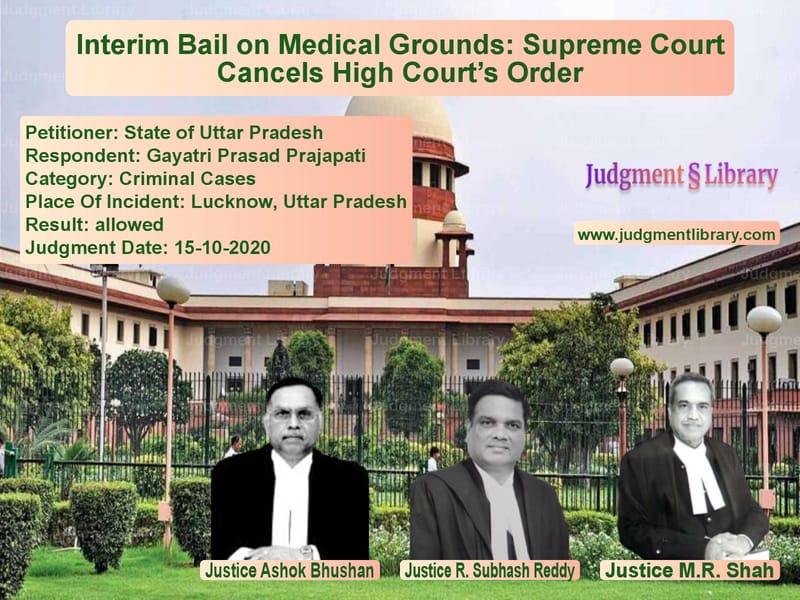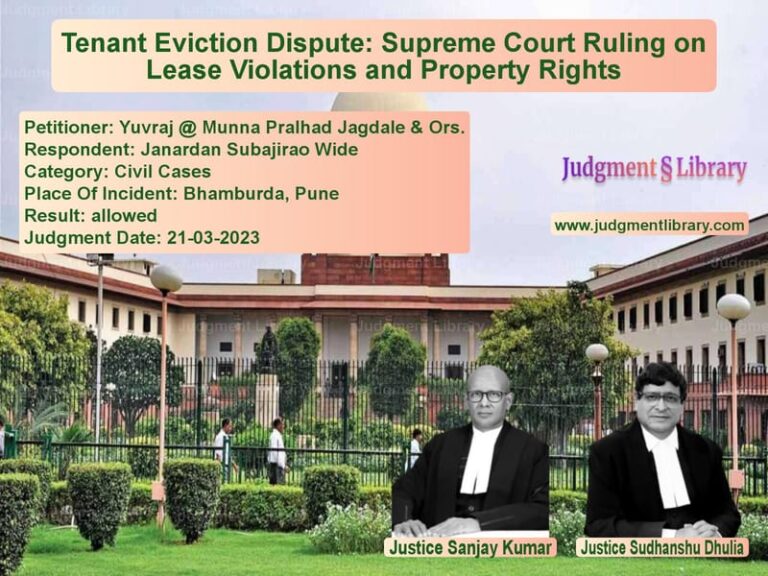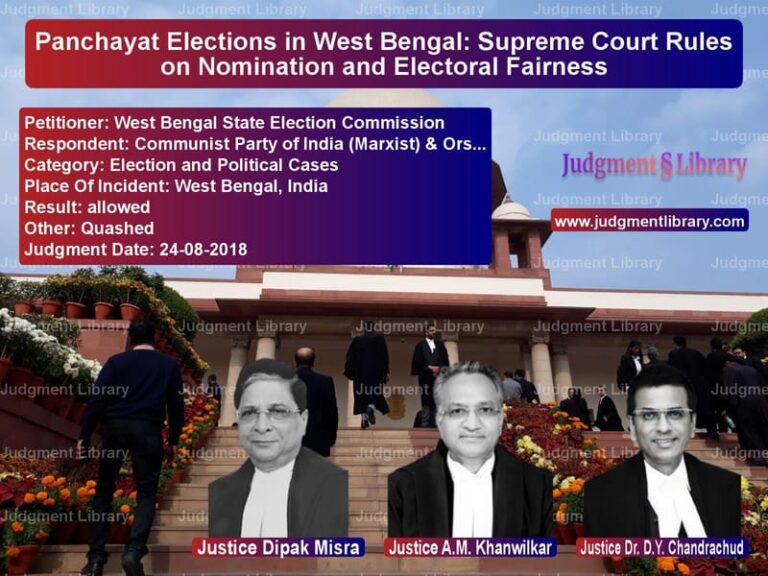Interim Bail on Medical Grounds: Supreme Court Cancels High Court’s Order
The case of State of Uttar Pradesh vs. Gayatri Prasad Prajapati deals with the question of whether interim bail on medical grounds was justified for the respondent, who was accused under serious criminal charges. The Supreme Court examined whether the Allahabad High Court erred in granting interim bail without adequately considering medical reports from the government hospitals treating the respondent.
Background of the Case
Gayatri Prasad Prajapati, a former minister in the Uttar Pradesh government, was accused in Crime No. 29 of 2017 under Sections 376(D)/376/511/504/506 of IPC and Sections 3/4 of the POCSO Act. The FIR was registered against him following a Supreme Court order dated 17.02.2017.
Prajapati was initially granted bail by the Additional District and Sessions Judge, Lucknow, on 25.04.2017. However, this bail was canceled by the High Court before he could be released. His subsequent bail application was also rejected on 14.12.2017.
Medical Treatment and Interim Bail
On 03.05.2019, Prajapati was admitted to King George Medical University (KGMU), Lucknow, and remained there until 17.01.2020. A fresh bail application was filed in the High Court on medical grounds, citing multiple health issues, including diabetes, hypertension, and a spinal disorder.
The High Court, on 03.09.2020, granted interim bail for two months, citing:
- Prajapati’s deteriorating health.
- Non-availability of proper treatment at KGMU.
- COVID-19 risk in prison.
- Recommendation for specialized treatment at a tertiary care hospital.
State of Uttar Pradesh’s Arguments
- Prajapati was being provided adequate medical care in KGMU and Sanjay Gandhi Postgraduate Institute of Medical Sciences (SGPGIMS), both top government hospitals.
- The High Court did not consider medical reports from these hospitals before granting bail.
- The High Court’s order lacked reasoning and relied only on limited medical observations.
- Interim bail was granted without considering that Prajapati had already spent most of his time in hospitals rather than prison.
Respondent’s (Prajapati’s) Arguments
- Regardless of the crime, every accused is entitled to humane treatment.
- Being moved between different hospitals was not by choice but due to medical necessity.
- KGMU and SGPGIMS themselves had referred him for further treatment.
- He should not be transferred back to jail while his treatment was ongoing.
Supreme Court’s Analysis and Judgment
1. Lack of Consideration for Medical Reports
The Supreme Court noted that the High Court failed to examine the reports from the Medical Board and SGPGIMS before granting bail. The Court observed:
“The High Court while passing the impugned order did not refer to reports of the medical board, which was submitted pursuant to its order.”
2. Availability of Adequate Medical Care in Prison
The Supreme Court found that the respondent was being provided adequate medical care in SGPGIMS, which is a super-specialty hospital. It stated:
“There was no satisfaction recorded by the High Court that treatment offered to the respondent was not adequate.”
3. Interim Bail Should Be Based on Medical Necessity
The Court held that interim bail should only be granted when it is medically necessary, not merely because the accused is unwell. It pointed out:
“Being treated in a hospital does not automatically entitle an accused to bail.”
4. No Justification for Residence Condition in Bail Order
The Supreme Court also questioned the High Court’s condition that the respondent should reside away from the complainant’s residence, noting that:
“The contemplation was that the respondent shall reside at his residence. This suggests that bail was granted not just for medical treatment but for other reasons.”
Final Verdict
The Supreme Court set aside the High Court’s order granting interim bail, stating that it was unsustainable. However, it clarified that this ruling would not affect the pending regular bail application in the High Court.
Key Takeaways
- Interim bail on medical grounds must be based on necessity, not convenience.
- Courts must carefully evaluate medical reports before granting bail.
- Being admitted to a hospital does not automatically justify bail.
- Conditions imposed on interim bail must align with the reason for granting it.
- Pending bail applications should be decided independently on merits.
This judgment reinforces the principle that medical care should be ensured in prison, but bail should only be granted when treatment outside is truly essential.
Petitioner Name: State of Uttar Pradesh.Respondent Name: Gayatri Prasad Prajapati.Judgment By: Justice Ashok Bhushan, Justice R. Subhash Reddy, Justice M.R. Shah.Place Of Incident: Lucknow, Uttar Pradesh.Judgment Date: 15-10-2020.
Don’t miss out on the full details! Download the complete judgment in PDF format below and gain valuable insights instantly!
Download Judgment: State of Uttar Prade vs Gayatri Prasad Praja Supreme Court of India Judgment Dated 15-10-2020.pdf
Direct Downlaod Judgment: Direct downlaod this Judgment
See all petitions in Bail and Anticipatory Bail
See all petitions in Judgment by Ashok Bhushan
See all petitions in Judgment by R. Subhash Reddy
See all petitions in Judgment by Mukeshkumar Rasikbhai Shah
See all petitions in allowed
See all petitions in supreme court of India judgments October 2020
See all petitions in 2020 judgments
See all posts in Criminal Cases Category
See all allowed petitions in Criminal Cases Category
See all Dismissed petitions in Criminal Cases Category
See all partially allowed petitions in Criminal Cases Category







